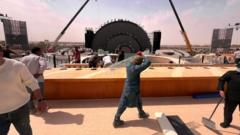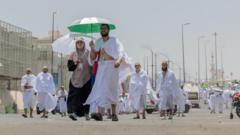As Saudi Arabia gears up for the 2034 World Cup, human rights groups like Human Rights Watch and FairSquare are raising alarms over a worrying spike in deaths among migrant construction workers. The reports reveal that many fatalities are misclassified, leaving families without compensation. Advocates urge the Saudi government and FIFA to implement better safety protocols to prevent further tragedies.
Urgent Call for Migrant Worker Protections Ahead of Saudi World Cup 2034

Urgent Call for Migrant Worker Protections Ahead of Saudi World Cup 2034
Human rights organizations highlight a troubling increase in migrant worker fatalities in Saudi Arabia, sparking demands for immediate safety measures as the nation prepares for the upcoming World Cup.
Human rights organizations are voicing serious concerns about a significant rise in deaths among migrant construction workers in Saudi Arabia, coinciding with preparations for the 2034 World Cup. Critical reports from Human Rights Watch and FairSquare highlight that many of these tragic fatalities result from preventable workplace accidents and are often recorded as "natural causes," depriving bereaved families of needed compensation. In light of these revelations, the organizations are pressing Saudi authorities to enforce necessary safety regulations to protect the vast migrant workforce involved in infrastructural projects for the tournament.
As the country embarks on creating extensive facilities—including 11 new stadiums, substantial transit systems, and a vast number of hotel accommodations—human rights advocates emphasize the potential human cost of such developments. Minky Worden, from Human Rights Watch, points out the irony of constructing what could become the largest and most expensive World Cup ever at the expense of migrant workers’ lives. This spike in concerns comes in tandem with a recent visit from FIFA President Gianni Infantino, who attended a forum promoting U.S.-Saudi investment.
Although FIFA claims a commitment to safeguarding human rights, critics argue that the organization has yet to learn from the worker fatalities that plagued the Qatar World Cup in 2022. Gathering statistics on migrant worker deaths in Saudi Arabia presents challenges, as human rights groups grapple with restricted access and the absence of labor unions. Interviews conducted by Human Rights Watch with the families of 31 workers from Bangladesh, India, and Nepal recount harrowing tales of workers suffering fatal accidents due to falls, machinery mishaps, and electrical hazards.
The risk of working in Saudi Arabia is compounded by the region's extreme heat, which intensifies as construction deadlines draw closer to the World Cup. In March, a Pakistani foreman tragically lost his life following a fall at a construction site in Al Khobar, marking the first documented death related to the World Cup. While the Saudi government has claimed improvements in occupational safety, there remains skepticism regarding the actual conditions on the ground. The global construction union, BWI, indicates an alarming spike in preventable accidents that stem from negligence and a lack of accountability.
Reports suggest that Saudi medical authorities often do not perform autopsies to determine the real cause behind migrant workers' deaths, further complicating accountability. FairSquare co-director James Lynch criticized FIFA's human rights practices as superficial and called for accountability measures to respect the lives and rights of migrant workers.
In response to the mounting pressure, FIFA announced plans to develop a workers' welfare system aimed at creating mandatory safety standards for construction and service-related work linked to the World Cup. However, Human Rights Watch has pointed out that details of the proposed measures remain vague and require clarity to be deemed effective.
The call to action emphasizes that all migrant worker deaths must be thoroughly investigated, ensuring families receive dignified treatment and timely compensation. The BBC has reached out to Saudi authorities for a response, underscoring the need for immediate action to protect vulnerable workers as the World Cup approaches.




















